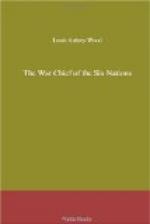In the middle of the summer of 1793 a great assembly of Indians took place at Miami Rapids. Commissioners who were sent to represent the United States were not allowed to approach the place of meeting. Brant made three speeches, urging upon the Indians the advisability of peace. But the red men were still headstrong, and the commissioners had to go away without having reached any understanding with them.
The end of the struggle, however, was coming fast. In 1794 General Wayne marched to the neighbourhood of Fort Miami with a numerous force, defeated the Indians at the Fallen Timbers, and drove them before him in all directions. Crestfallen and heartsore, they saw that the day of the white man had come at last. Brant stood by as their helper to the very end, but it availed them little. The Black Snake, as they called General Wayne, had beaten them, and they knew he would beat them again. The tribesmen who had come from the far west withdrew sullenly across the Mississippi, the other races submitted, and the Treaty of Greenville was signed with General Wayne on August 3, 1795. The ox-cart began to rumble north of the Ohio; the tall forests fell before the settler’s axe, and the red man lived and walked no more alone by the ‘River Beautiful.’
CHAPTER XIV
THE CHURCH BELL RINGS
Joseph Brant had been a valiant warrior; he had dealt with the affairs of the Six Nations wisely and well. But he had never forgotten that one of the first duties of any ruler is to be, in some sense, a priest unto his people. From a lad, he seems to have been a devoted Christian. The alarms of war had drawn his mind for a period, it is true, to worldly considerations alone, but now that strife had ceased he became once more the friend of the missionary and sought to supply the spiritual needs of the tribes over which his influence was felt.
Like every Indian, the wonderful things which Brant saw all about him in nature held his mind in a spell. To him there was One who had created all things, and who was ever ready and willing to sustain His children. On one occasion in council Brant spoke of the primitive freedom of the Indian people, and then exclaimed: ’This country was given to us by the Great Spirit above; we wish to enjoy it.’ He went on to tell how the Indians had tried to get peace, how their efforts had failed, and how their patience was now all gone. Yet there was one covert in which they might find shelter in time of storm. ’We therefore throw ourselves,’ was his final utterance, ’under the protection of the Great Spirit above, who, we hope, will order all things for the best.’




